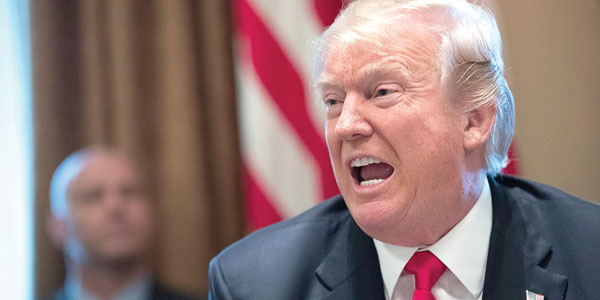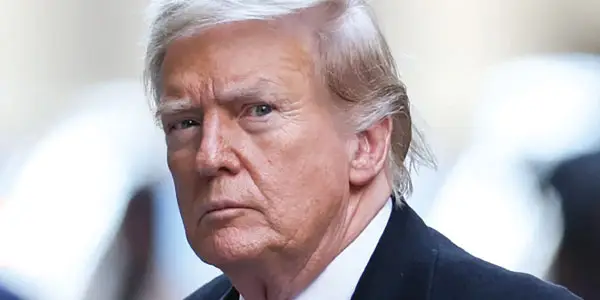
By Jorge Ramos
Do you think President Donald Trump is a racist? Even if you think it’s an awkward question to ask, we should all think about our answer, especially Republicans and those who voted for Trump. If your answer is yes, you’re morally bound to do something about it.
I pose the question not because of something Trump has said specifically, but because of the punishment imposed on Steve King, a Republican congressman from Iowa, after he made some racist comments recently.
In an interview with The New York Times earlier this month, King posed this question: “White nationalist, white supremacist, Western civilization — how did that language become offensive?”
Apparently King needs to be reminded that these words are offensive because white nationalists and white supremacists, claiming to be acting in defense of racial purity, caused the deaths of millions of people during the Holocaust and throughout history, and have been involved in an untold number of attacks since then. According to the Southern Poverty Law Center, in 2017 there were 121 neo-Nazi groups and 72 white supremacist groups operating in the United States.
King, who has a long history of making racist remarks — and who once claimed that some immigrants had “calves the size of cantaloupes because they’re hauling 75 pounds of marijuana across the desert” — wasn’t expelled from Congress after his comments were published by the Times, but was removed from all his committee seats in the House of Representatives. Other representatives are calling for his resignation.
But if King has been punished for his remarks, should Trump, who has also made racist comments, be punished as well? Can a president be punished in the same way as a lawmaker?
In a recent episode of “60 Minutes,” Anderson Cooper asked Alexandria Ocasio-Cortez, the freshman congresswoman from New York, if she thought Trump was a racist. Her answer was unequivocal: “Yeah, yeah. No question.”
Later, on Twitter, the 29-year-old representative — the youngest woman ever elected to the House — went into more detail: “The president defended neo-Nazis who murdered a woman in Charlottesville. The Department of Justice sued him for not renting to black tenants. He launched his campaign by calling Mexicans ‘rapists.’ He banned Muslims. The president is racist. And that should make you uncomfortable.”
Trump did indeed kick off his presidential campaign in June 2015 by focusing on Mexican immigrants. “When Mexico sends its people, they’re not sending their best,” he said. “They’re not sending you. They’re not sending you. They’re sending people that have lots of problems, and they’re bringing those problems with us. They’re bringing drugs. They’re bringing crime. They’re rapists. And some, I assume, are good people.”
That is an openly racist remark.
But there’s more. In 2016, Trump suggested that Gonzalo Curiel, the federal judge then presiding over a lawsuit against Trump University, could not be impartial due to his ethnicity. Trump said in a CNN interview then that the case represented a conflict of interest because Trump wanted to build a wall along the U.S. border with Mexico and Curiel was “of Mexican heritage.”
Believing that someone cannot do their job well because of their racial or ethnic background is one of the worst manifestations of racism. And that’s the thinking Trump played into. (It should be clarified that Judge Curiel, whose parents are Mexican, was, in fact, born in the state of Indiana.)
The president doesn’t think he is racist. “I’m the least racist person that you’ve ever met,” he said in a TV interview with CNN’s Don Lemon in late 2015.
It’s impossible to get into Trump’s head. I don’t know what’s in there. But I am well aware of what has come out of his mouth. And what I’ve heard are racist remarks.
What kind of punishment does a president who has said such things deserve? The only thing worse than a politician who unashamedly voices his prejudices is a group that tolerates his views, cheers him on and emulates his behavior. We have known about Trump’s racism for a long time, yet some 62 million Americans still voted for him.
But King’s punishment indicates that a change may be coming. I hope it goes beyond that.
______________________________________________________________________________________________
¿Es Trump un Racista?
¿Crees tú que el presidente de Estados Unidos, Donald Trump, es un racista? Aunque incomode, esta es una pregunta que todos debemos responder. Pero, particularmente, los Republicanos y los que votaron por él. Si la respuesta es “sí”, entonces ellos están obligados (moralmente) a hacer algo al respecto.
Todo esto surge por el castigo impuesto al congresista Republicano, Steve King.
En una entrevista con el diario The New York Times, King dijo lo siguiente: “Nacionalistas blancos, supremacistas blancos, la civilización occidental ¿en qué momento ese lenguaje se convirtió en ofensivo?”
Basta decirle al congresista King que esas palabras se convirtieron en ofensivas cuando nacionalistas y supremacistas blancos, en nombre de su raza, ocasionaron la muerte de millones de personas durante el Holocausto y hoy, todavía, son responsables de muchos ataques. En el 2017 había 121 grupos neo-Nazi y 72 de supremacistas blancos en Estados Unidos, según el Southern Poverty Law Center.
King, quien tiene una larga historia de declaraciones racistas — y que alguna vez dijo que hay inmigrantes “con pantorrillas del tamaño de melones porque llevan 75 libras de marihuana por el desierto” — no fue expulsado del Congreso. Pero perdió su puesto en todas las comisiones de la Cámara de Representantes y muchos colegas están pidiendo su renuncia. Ese fue su castigo.
Si King fue castigado debido a sus opiniones racistas ¿se debería juzgar de la misma manera a Trump, quien también ha hecho comentarios racistas? ¿Debe un presidente ser castigado igual que un congresista?
Cuando el periodista Anderson Cooper le preguntó en el programa “60 Minutes” a la nueva congresista Alexandria Ocasio-Cortez si Trump era un racista, su respuesta fue inequívoca: “Sí, sí. No hay duda”, dijo.
Luego, en su cuenta de Twitter, la congresista de 29 años de edad — la más joven en la historia del país — fue mucho más específica: “El Presidente defendió a los neo-Nazis que mataron a una mujer en Charlottesville. El Departamento de Justicia lo demandó por no rentarle [propiedades] a inquilinos negros. Lanzó su campaña [presidencial] llamándole ‘violadores’ a los mexicanos. Prohibió la entrada de musulmanes. El Presidente es un racista. Y esto te debe hacer sentir incómodo”.
Trump, efectivamente, inició su campaña por la Casa Blanca en junio del 2015 diciendo esto sobre los inmigrantes mexicanos: “Cuando México envía a su gente, no envía a los mejores. … Está enviando gente con muchos problemas. … Traen drogas. Traen crimen. Son violadores. Y algunos, supongo, son buenas personas”.
Ese es un comentario abiertamente racista.
Pero hay más. En el 2016 el actual Presidente sugirió que el juez Gonzalo Curiel — quien había sido asignado a un juicio sobre la Universidad Trump — no podía hacer bien su trabajo y ser imparcial debido a su herencia hispana. Trump explicó en una entrevista con CNN cual era, desde su punto de vista, el conflicto de interés: Trump quería construir un muro con México y el juez Curiel era “de origen mexicano”.
Esa es una de las peores consecuencias del racismo: creer que alguien no puede hacer bien su trabajo debido a su origen racial o étnico. Y eso es lo que dijo Trump. (Basta aclarar que el juez Curiel, de padres mexicanos, nació en Indiana.)
A pesar de estos dos ejemplos concretos de expresiones racistas por parte de Trump y de las acusaciones de la congresista Ocasio-Cortez, entre muchas otras, el Presidente no se considera a sí mismo un racista. “Soy la persona menos racista que tú hayas conocido”, le dijo en una entrevista de televisión a finales del 2015 al periodista Don Lemon.
Es imposible meterse en la cabeza de Trump. No sé lo que hay ahí dentro. Pero sí sé lo que ha salido de su boca. Y lo que yo he escuchado son expresiones racistas.
¿Cómo se castiga a un presidente que ha hecho comentarios así? Lo único peor que un político que expresa sus prejuicios sin vergüenza es un grupo que tolera, celebra y repite dicho comportamiento. Lo de Trump ya lo sabíamos hace mucho tiempo y aún así más de 62 millones de personas votaron por él.
Pero todo cambia. El castigo a King es una señal importante. Es un grito de “basta ya”. Ojalá no se quede ahí.
Editor Notes: Jorge Ramos, periodista ganador del Emmy, es el principal director de noticias de Univision Network.









